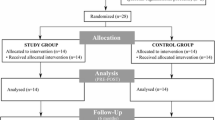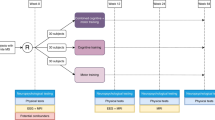Summary
BACKGROUND: One aim of this project was to investigate the efficacy of a specific training programme for MS patients which also contained compensation strategies and relaxation exercises relevant to everyday life. The other aim was to check the programme's relevance to everyday life. METHOD: 19 patients, randomised into two groups, took part in the study. The participants in the treated group completed a specific neurological training programme which began immediately after the basic testing (visit 1) and lasted 4 weeks, with a total of 12 sessions. The monitoring test was done immediately after the training programme (at visit 2) and the follow-up was 3 months later (visit 3). Both study groups were fully comparable as regards clinical and socio-demographic data and baseline intelligence level. RESULTS: The results of the cognitive training programme were especially evident in the significant improvements in executive functions (CKV) and spatial-constructional abilities (HAWIE-R). Comparison between the treated and the control group showed no significant difference in the fatigue values (MFIS). However, when the treated group was examined over the three times of measurements, the symptoms of fatigue had diminished significantly. Regarding memory, comparison of the groups showed no changes; within the treated group; however, the verbal (VLT) and nonverbal learning and memory (NVLT) improved significantly. The results for sustained attention improved in both groups over time. It must be assumed that a learning effect had occurred here. The depression values (BDI) also improved in both study groups. The follow-up questionnaire showed that 60% (6) attributed an average to above-average benefit to the training. CONCLUSION: To summarise, it is apparent that MS patients with mild to moderate cognitive impairment are able to profit from even a fairly brief neuropsychological training programme and to integrate much of it into their everyday lives. In view of this, it would seem appropriate to offer such a programme as standard, associated with medication.
Zusammenfassung
HINTERGRUND: Das Ziel dieses Projekts war es einerseits die Effizienz eines spezifischen Trainings, das auch alltagsrelevante Kompensationsstrategien und Entspannungsübungen beinhaltet, bei MS-Patienten zu untersuchen und andererseits auch dessen Alltagsrelevanz zu überprüfen. METHODE: 19 PatientInnen, randomisiert in zwei Gruppen, nahmen an der Untersuchung teil. Die Teilnehmer der Versuchsgruppe absolvierten ein spezifisches neuropsychologisches Trainingsprogramm, das unmittelbar nach der Basistestung (visit 1) begann und 4 Wochen dauerte, wobei insgesamt 12 Sitzungen stattfanden. Unmittelbar nach dem Training erfolgte die Kontrolltestung (visit 2) und nach den darauf folgenden 3 Monaten das Follow-up (visit 3). Beide Untersuchungsgruppen waren bezüglich ihrer klinischen und soziodemografischen Daten und bezüglich des intellektuellen Ausgangsniveaus gut miteinander vergleichbar. ERGEBNISSE: Die Erfolge des kognitiven Trainingsprogramms zeigten sich vor allem in den signifikanten Verbesserungen der Exekutivfunktionen (CKV) und der räumlich-konstruktiven Fähigkeiten (HAWIE-R). Im Vergleich zwischen Versuchsgruppe und Kontrollgruppe zeigte sich kein signifikanter Unterschied in den Fatigue-Werten (Ermüdungswerten) (MFIS). Bei Betrachtung der Therapiegruppe über die Dauer der drei Messzeitpunkte, nahmen die Ermüdungserscheinungen jedoch signifikant ab. Die Änderungen im Gedächtnisbereich konnten im Gruppenvergleich nicht nachgewiesen werden, innerhalb der Trainingsgruppe verbesserten sich die verbalen (VLT) und nonverbalen Lern- und Gedächtnisleistungen (NVLT) jedoch signifikant. Die Daueraufmerksamkeitsleistungen (Daueraufmerksamkeit) besserten sich in beiden Gruppen über die Zeit hinweg. Es ist anzunehmen, dass es dabei zu einem Lerneffekt gekommen ist. Die Depressionswerte (BDI) verbesserten sich ebenfalls in beiden Untersuchungsgruppen. Der Nachbefragungsbogen ergab, dass 60 % (6) dem Training einen durchschnittlich bis überdurchschnittlich hohen Gewinn beimaßen. SCHLUSSFOLGERUNG: Zusammenfassend zeigt sich, dass MS-Patienten mit einer leichten bis mittelgradigen kognitiven Störung auch von einem relativ kurzen neuropsychologischen Trainingsprogramms profitieren und vieles davon in ihren Alltag integrieren können. Insofern wäre es sinnvoll, ein derartiges Programm in Kombination mit einer medikamentösen Behandlung standardmäßig anzubieten.
Similar content being viewed by others
Author information
Authors and Affiliations
Corresponding author
Rights and permissions
About this article
Cite this article
Tesar, N., Bandion, K. & Baumhackl, U. Efficacy of a neuropsychological training programme for patients with multiple sclerosis – a randomised controlled trial. Wien Klin Wochenschr 117, 747–754 (2005). https://doi.org/10.1007/s00508-005-0470-4
Received:
Accepted:
Published:
Issue Date:
DOI: https://doi.org/10.1007/s00508-005-0470-4




